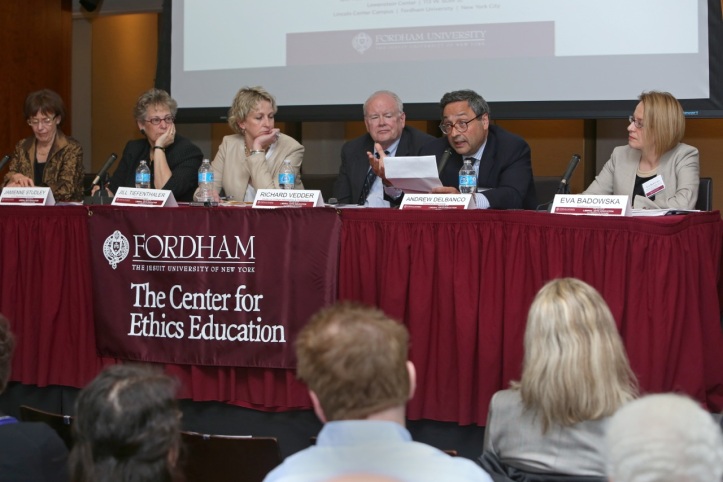
What is the value of a liberal arts education, and what place does it have in America’s future? An interdisciplinary conference sponsored by the Fordham University Center for Ethics Education on April 28 addressed these issues, and featured presentations from several leading liberal arts scholars, including Acting Under Secretary of Education, Jamienne Studley.

Center for Ethics Education Director Celia B. Fisher, Ph.D. provided the opening remarks noting that “we approach this evening’s discussion at a time when we as a society are at a critical economic and educational precipice.”
“In times of economic difficulty, it is customary to critically examine educational practices to determine how best to prepare the next generation for the task of engaging in a world that is constantly changing,” Fisher continued.

The panel addressed several critical moral questions on the value of liberal arts education, including:
- How do we ensure that college learning experiences enable graduates to attain not only employment, but the tools and motivation to live a life of moral thought and action?
- What responsibility do educational institutions and government have in protecting young adults from the burdens of long term student debt?
- What are the societal consequences of creating a false dichotomy between educational experiences that foster market utility versus ethical habits of mind?
- Will a weakening of arts and science offerings similarly weaken the developing ability of young adults to discern, preserve, and pursue moral goods for themselves and for subsequent generations?

In addition to Fisher and Studley, other speakers at the conference included Fordham University Associate Dean for Academic Programs at the Graduate School of Arts and Sciences and Chair of the Task Force on Liberal Education Eva Badowska, Ph.D.; Swarthmore College President Rebecca Chopp, Ph.D.; Colorado College President Jill Tiefenthaler, Ph.D; Director of the Center for College Affordability and Accountability Richard Vedder, Ph.D.; and Andrew Delbanco, Ph.D., professor of humanities at Columbia University.

The panel covered a wide range of issues, including how to best engage Millennials in liberal arts education and give them the transferrable skills they need for the workplace. In addition, several speakers discussed the importance of “associative living” — in other words, living and working together on a liberal arts campus.

The monetary value of liberal education was also defended, by Vedder in particular, who made the case that in the long run, liberal arts degrees not only pay off in terms of the training, but also financially. Lastly, Delbanco reminded the audience that the debate over the value of liberal arts education is nothing new, and cites an example of Abigail Adams bemoaning the state of education. Ultimately, however, he concluded that “nothing is more fundamentally American than liberal education.”

For more information on the conference, please read Fordham University’s news coverage of the event.
[…] a recent interdisciplinary conference hosted by the Fordham University Center for Ethics Education, a distinguished panel comprised of […]
[…] a recent interdisciplinary conference hosted by the Fordham University Center for Ethics Education, a distinguished panel comprised of […]
[…] a recent interdisciplinary conference hosted by the Fordham University Center for Ethics Education, a distinguished panel comprised of […]